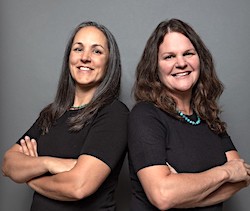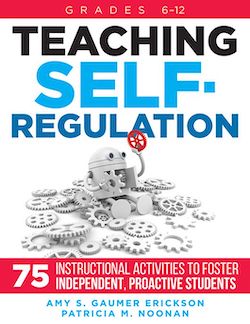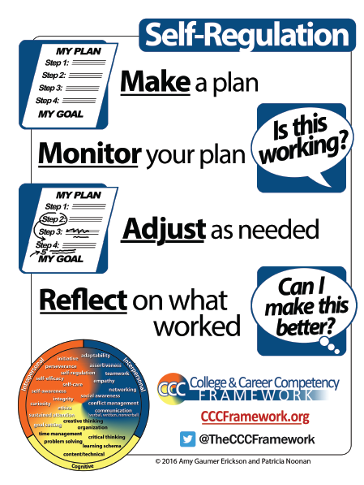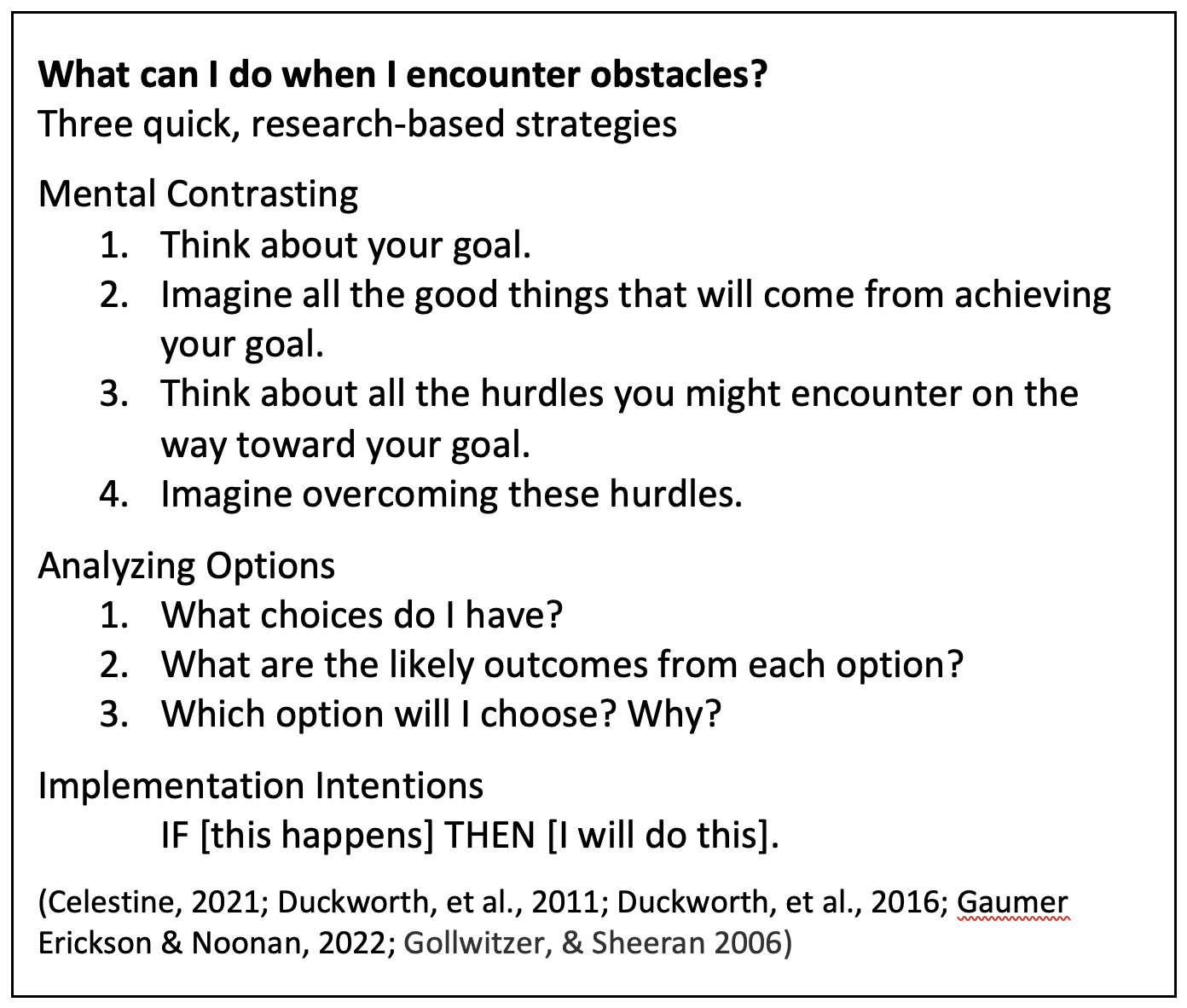Helping Middle Grades Students Self-Regulate
By Dr. Amy Gaumer Erickson and Dr. Pattie Noonan
 We all want our adolescent students to become independent, lifelong learners who can set goals for themselves and complete important tasks. When students struggle with staying on task, reaching goals, and taking ownership of their learning, they lack self-regulation.
We all want our adolescent students to become independent, lifelong learners who can set goals for themselves and complete important tasks. When students struggle with staying on task, reaching goals, and taking ownership of their learning, they lack self-regulation.
Self-regulation is a proactive, self-directed process for attaining goals, learning skills, managing emotional reactions, and accomplishing tasks (Gaumer Erickson & Noonan, 2021, p. 1).
Students can learn specific skills to support their ability to self-regulate. The 6-minute video below introduces the concept of self-regulation, clarifies the definition, and provides examples of self-regulation at home and at school.
Students who learn self-regulation skills experience benefits such as completing more of their homework on time, doing better in their classes, feeling more in control of their learning and their upcoming tasks, getting better at organization and time management, and learning more in their classes.
They are also better at figuring out specific reasons that they are struggling with something and directly addressing those complications, as well as gaining a better understanding of how specific actions they take (or don’t take) have an impact on their progress and overall success.
In addition to academics, self-regulation can be applied to improving musical, artistic, or athletic ability; maintaining control over your emotional reactions; and reaching a variety of goals.
Looking into self-regulation components
Let’s explore the self-regulation process. It contains four essential components and works with students across grades 6-12 with appropriate adjustments.
► First, students must plan how to progress toward meeting goals. This includes creating detailed plans, monitoring, adjusting, and reflecting. It is imperative that students direct their own success.
In this video, you will hear from Izzy, a high school senior. She talks about how she created a plan to complete her online Physics homework.
► The second component is monitoring your plan. When students begin monitoring, it is crucial that they learn how to monitor actions instead of just outcomes. One way a student could monitor improving their grade would be to write down the questions they missed on each assignment and find the correct answers. The student would be monitoring the action of finding the correct answers to see if it is improving their science grade instead of simply monitoring the grade itself (the outcome) after turning in each assignment.
Izzy’s plan included time management, organization of her assignments, and consideration of distractions that might derail her plan. Let’s take another look as Izzy explains the difference between monitoring progress and monitoring actions.
Izzy used a checklist to monitor her assignment completion. She also reflected on her choices for breaks and adjusted her plan to include exercise as a break instead of snacking as she noticed physical activity helped her be more productive.
► The third component is ‘adjusting as needed’. This means that students are able to determine if their plan is working or not and make adjustments to their actions to increase their likelihood of meeting the goal or accomplishing the task.
Students can learn how to predict obstacles that could derail their plan and actions they could take to prevent those obstacles from getting them off-track by using If–Then statements (If I encounter this obstacle, then I will do this) and learning how to manage distractions.
► The fourth component is reflecting. It is important for students to take time to think about what is working and what is not going well. When they are able to reflect and identify strategies that are helping them self-regulate, they can use those the next time they need to accomplish a task. Even though it is the last component listed, students should be actively reflecting on how things are going throughout the process.
How we can help students persist
When students encounter setbacks to their plan, they may find it difficult to persist. Here, Amy describes three strategies to help students overcome obstacles: mental contrasting, analyzing options, and stating implementation intentions.
Next Steps
We want to support our students by coaching them rather than directing them. Self-regulation fuels students to become socially and emotionally engaged, lifelong learners.
Also see the article by these authors:
Add Assertiveness to Tweens’ Communication
References
Celestine, N. (2021). What is mental contrasting and how to benefit from it? Positive Psychology. Available from https://positivepsychology.com/mental-contrasting/
Duckworth, A. L., Grant, H., Loew, B., Oettingen, G., & Gollwitzer, P. M. (2011). Self‐regulation strategies improve self‐discipline in adolescents: Benefits of mental contrasting and implementation intentions. Educational Psychology, 31(1), 17-26. https://doi.org/10.1080/01443410.2010.506003
Duckworth, A. L., White, R. E., Matteucci, A. J., Shearer, A., & Gross, J. J. (2016). A stitch in time: Strategic self-control in high school and college students. Journal of Educational Psychology, 108(3), 329-341. https://doi.org/10.1037/edu0000062
Gaumer Erickson, A.S., & Noonan, P.M. (2021). Teaching Self-Regulation: Seventy-Five Instructional Activities to Foster Independent, Proactive Students, Grades 6-12. Solution Tree.
Gollwitzer, P. M., & Sheeran, P. (2006). Implementation intentions and goal achievement: A meta-analysis of effects and processes. In M. P. Zanna (Ed.), Advances in experimental social psychology (38, 69-119). Elsevier Academic Press. https://doi.org/10.1016/S0065-2601(06)38002-1

Amy’s practice-based research focuses on the implementation of intra- and interpersonal competencies instruction within a Multi-Tier System of Supports (MTSS), guiding educators to embed competency instruction within content-area coursework and evaluate students’ social-emotional growth. She has taught at the middle and high school levels in urban, suburban, charter and alternative schools.
Dr. Pattie Noonan is an associate research professor at the University of Kansas where she centers her work on providing and evaluating professional development related to social emotional learning. She holds a firm belief in the capacity of all students to become socially and emotionally engaged, career equipped, lifelong learners. Much of her work entails providing schoolwide professional development and coaching to educators, counselors, trainers, and instructional coaches, while working in close collaboration with leadership. Pattie is the co-author, with Amy, of The Skills That Matter and Teaching Self-Regulation.




































for now on i will make a planner for homework
Self regulation is something we must focus on while on school or anywhere else. We need to manage some of our times like our screen/phone/TV time as well as our studying time.if you are in school you should focus more on your studying time and less on your screen time. if you do decide to do this it could make a big change in your school grades and will help you a lot.
self regulation is something you should focus on and if you focus on that and then you focus on stuff like your grades you can get the best grades ever.